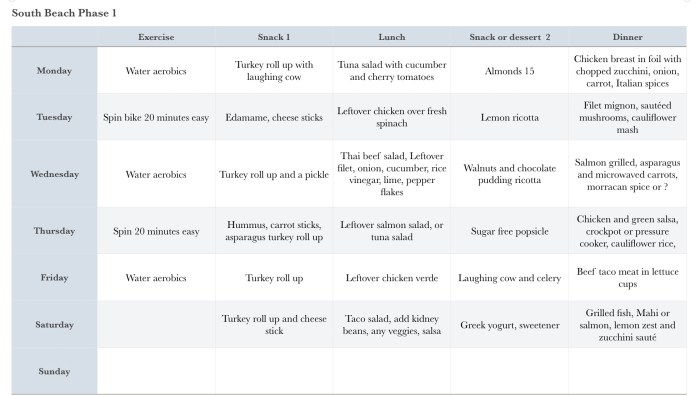South Beach Diet Plan Pdf: Unlocking the secrets to sustainable weight loss isn’t about restrictive diets or fad trends; it’s about a smart, science-backed approach. This plan, meticulously detailed in this PDF, guides you through three distinct phases, each designed to gently shift your eating habits towards a healthier, more balanced lifestyle. We’ll explore the science behind the carbohydrate restrictions, reveal delicious meal plans, and address potential benefits and risks, equipping you with the knowledge to make informed choices.
Forget crash diets – the South Beach Diet emphasizes sustainable changes. We’ll delve into the specifics of each phase, providing sample meal plans, shopping lists, and even adaptable recipes to ensure you stay on track. Discover how to navigate the potential challenges, maintain long-term results, and ultimately achieve your weight loss goals without sacrificing flavor or satisfaction.
Maintaining Long-Term Results

Successfully completing the South Beach Diet is a significant achievement, but maintaining your weight loss long-term requires a strategic and sustainable approach. It’s not about reverting to old habits; it’s about integrating healthy choices into your lifestyle seamlessly. This section details strategies to ensure your hard-earned progress endures.The key to long-term weight management lies in understanding that dieting is not a temporary fix, but a lifestyle transformation.
It’s about building healthy habits that you can maintain indefinitely, rather than adhering to restrictive rules for a limited period. This involves a holistic approach encompassing diet, exercise, and mindful lifestyle changes.
The Importance of Continued Healthy Eating
Maintaining a healthy weight after completing the South Beach Diet necessitates a gradual return to a balanced diet. Avoid abruptly resuming old eating habits, which can lead to rapid weight regain. Instead, focus on incorporating the principles learned during the diet into your daily meals. This means prioritizing lean proteins, healthy fats, and plenty of non-starchy vegetables.
Gradually reintroduce some carbohydrates, but choose complex carbohydrates over refined sugars. Mindful portion control remains crucial. For example, instead of drastically cutting out carbohydrates, slowly increase your intake of whole grains like brown rice or quinoa while monitoring your weight and adjusting portion sizes accordingly. This gradual approach helps prevent sudden weight fluctuations and promotes sustainable weight management.
Incorporating Regular Exercise into a Weight-Management Plan
Regular physical activity is not merely beneficial; it’s essential for maintaining weight loss. Exercise burns calories, boosts metabolism, and improves overall health. Aim for at least 150 minutes of moderate-intensity aerobic activity or 75 minutes of vigorous-intensity aerobic activity per week, spread throughout the week. This could include brisk walking, jogging, swimming, cycling, or any activity that elevates your heart rate.
In addition to cardiovascular exercise, incorporate strength training exercises at least twice a week. Strength training builds muscle mass, which increases your metabolism and helps burn more calories even at rest. For instance, a combination of 30-minute brisk walks three times a week and two 30-minute strength training sessions can significantly contribute to long-term weight maintenance.
Sustainable Lifestyle Changes for Long-Term Health
Making lasting changes requires a commitment to sustainable lifestyle modifications. These changes should be gradual and integrated into your daily routine rather than imposed as drastic shifts. The following points represent key strategies for achieving long-term success.
- Prioritize Sleep: Aim for 7-9 hours of quality sleep each night. Sleep deprivation can disrupt hormones that regulate appetite and metabolism, making weight management more challenging.
- Manage Stress: Chronic stress can lead to overeating. Practice stress-management techniques such as yoga, meditation, or spending time in nature.
- Stay Hydrated: Drink plenty of water throughout the day. Water helps you feel full, aids digestion, and supports overall bodily functions.
- Mindful Eating: Pay attention to your hunger and fullness cues. Eat slowly, savor your food, and avoid distractions while eating.
- Seek Support: Join a support group or work with a registered dietitian or personal trainer for guidance and accountability.
Scientific Evidence and Research: South Beach Diet Plan Pdf

The South Beach Diet, while popular, lacks the extensive, high-quality research backing many other weight-loss approaches. While anecdotal evidence and some smaller studies suggest potential benefits, a comprehensive understanding of its long-term efficacy and safety requires further investigation. The available research is often limited in scope, methodology, and participant diversity, making it challenging to draw definitive conclusions.The available research on the South Beach Diet primarily focuses on short-term weight loss and metabolic changes.
Many studies are observational, meaning they track participants’ experiences without actively manipulating variables, limiting the ability to establish cause-and-effect relationships. This makes it difficult to isolate the diet’s impact from other lifestyle factors that may contribute to weight change.
Studies on Weight Loss and Metabolic Effects
Several studies have examined the short-term weight loss effects of the South Beach Diet. These studies often report modest weight loss in participants, typically within the range of 5-10% of initial body weight over several weeks or months. However, these studies often lack a control group following a standard diet, making it challenging to definitively attribute the weight loss solely to the South Beach Diet’s principles.
Furthermore, long-term follow-up data is often limited, leaving questions about the sustainability of weight loss achieved through this approach.
A meta-analysis of various low-carbohydrate diets, including elements similar to the South Beach Diet, found that while initial weight loss is often observed, long-term weight maintenance is challenging and requires sustained adherence to the dietary plan.
Limitations of Existing Research
The research on the South Beach Diet suffers from several methodological limitations. Many studies are small, with limited participant numbers, reducing the statistical power to detect significant effects. The lack of standardized protocols for the diet itself across studies also hinders comparisons and the ability to draw generalized conclusions. Furthermore, the majority of studies are short-term, making it difficult to assess the long-term health consequences and sustainability of weight loss.
The lack of long-term studies limits our understanding of potential adverse effects and the overall impact on health markers beyond weight.
The absence of large-scale, randomized controlled trials with long-term follow-up significantly limits our ability to confidently assess the long-term efficacy and safety of the South Beach Diet.
Cardiovascular Risk Factors and Blood Lipid Profiles, South Beach Diet Plan Pdf
Some studies have investigated the impact of the South Beach Diet on cardiovascular risk factors, such as blood pressure and lipid profiles. Preliminary findings suggest potential positive effects on these parameters in some individuals. However, the evidence is far from conclusive, and more research is needed to establish a clear link between the diet and improvements in cardiovascular health.
The heterogeneity of study designs and participant characteristics makes it challenging to draw robust conclusions.
While some studies show potential benefits on blood lipid profiles, more rigorous research is necessary to confirm these effects and determine the long-term cardiovascular implications of the South Beach Diet.
Ultimately, the South Beach Diet Plan Pdf isn’t just a diet; it’s a comprehensive guide to a healthier you. By understanding the principles behind the three phases, incorporating the delicious recipes, and adapting the plan to your lifestyle, you can achieve sustainable weight loss and improved well-being. Remember, consistency and mindful eating are key to long-term success. This PDF provides the tools; your commitment fuels the results.

